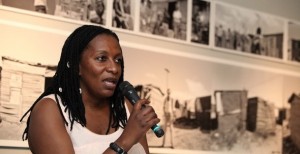
Carol Nyirenda, national coordinator of Zambia’s Community Initiative for Tuberculosis, HIV/AIDS and Malaria (CITAM+), spoke at the first of a series of gallery talk sessions organized in parallel with the photo exhibition Access to Life. She spoke to an audience of more than 40 participants about her experience as an HIV/AIDS patient and the dramatic improvement in her life after she began receiving treatment.
Ms. Nyirenda shared her personal story of living with HIV/AIDS in Zambia, where antiretroviral (ARV) treatment was expensive and difficult to obtain. It was only after the free rollout of the ARV drugs—enabled by funding from international organizations such as the Global Fund to Fight AIDS, Tuberculosis and Malaria—that she was able to regain her health. Upon overcoming tuberculosis, skin cancer, and her weakened condition from AIDS, she became engaged in support-group activities and later in international HIV/AIDS, tuberculosis, and human rights advocacy. She currently serves as a board member of the Global Fund representing the communities living with the diseases.
Ms. Nyirenda, who sees herself as a bridge between affected communities and international organizations and donors, emphasized the importance of listening to recipient countries and remembering that actual lives—rather than just figures on paper—are at stake in this struggle. It is essential that people around the world take a personal interest in these three diseases because globalization has broken down physical and geographic barriers that could otherwise stop the spread of disease among individuals, whether in industrialized or developing countries. At the same time, stigma surrounding HIV/AIDS has kept many from seeking testing and can severely isolate those who test positive.
Ms. Nyirenda also spoke about what is being done at the community level, including through the work of organizations such as CITAM+. In rural areas that lack access to information, community participation in spreading information about disease prevention and treatment is vital. To fill the gap left by government services, recipients of free ARV treatment are themselves actively spreading health information and improving access to treatment for others in rural areas.
As a final note, Ms. Nyirenda expressed her hope that participants would walk away from the event proud of the huge achievements made so far in the fight against HIV/AIDS and renew their commitment to providing greater support for these efforts.

